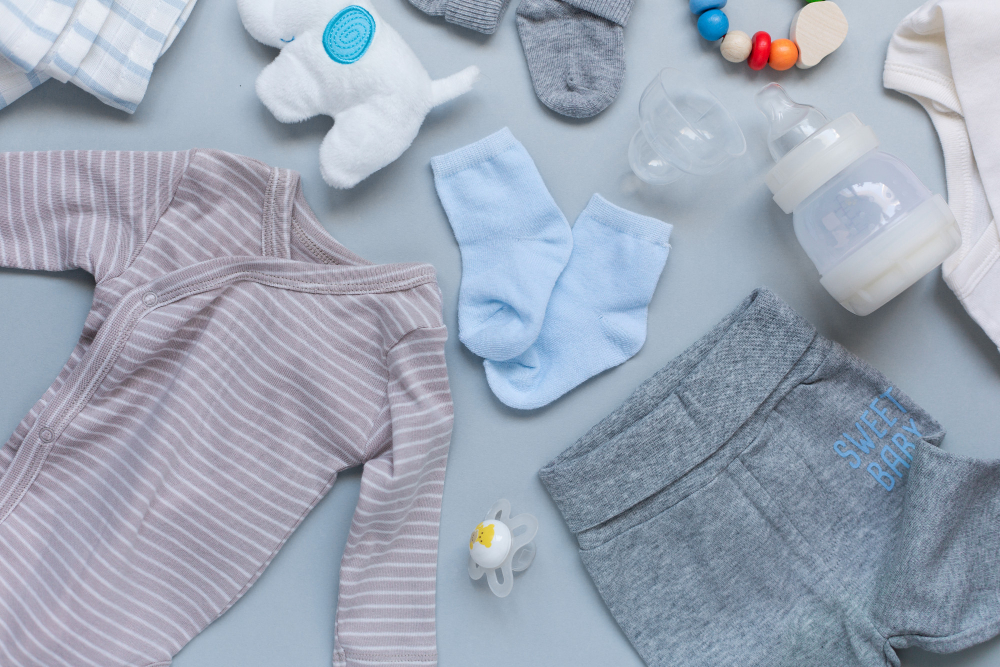
Blog
The Ultimate Baby Essentials Buying Guide for New Parents

Welcoming a new baby is a joyous milestone, but it can also feel overwhelming, especially when deciding which essentials to buy. With countless products on the market, knowing what’s truly necessary versus what’s just “nice to have” is crucial. This guide will help new parents make informed decisions and create a practical baby essentials checklist. Here are some easy and useful tips that make your parenthood journey smooth and responsible.
1. Clothing: Comfort Over Style
Babies grow fast, so buying limited quantities in smaller sizes is wise. Choose soft, breathable fabrics that are gentle on your baby’s sensitive skin.
Essentials:
- 5-7 onesies or bodysuits (short and long-sleeved)
- 4-6 sleepers with footies
- 2-3 pairs of mittens and hats
- 3-5 pairs of socks
- Seasonal outerwear as needed
Avoid fancy outfits that are difficult to put on or uncomfortable for the baby. Always prioritize comfort and easy access for diaper changes.

2. Diapering: Stock Up Wisely
Whether you choose disposable or cloth diapers, keeping a sufficient supply is essential. Don’t forget about related accessories.
Essentials:
- Newborn-sized diapers (around 200-300 for the first month)
- Reusable or disposable wipes
- Diaper rash cream
- A sturdy diaper bag
- Changing pad
If you’re considering cloth diapering, ensure you have 20-24 cloth diapers and a waterproof wet bag for soiled ones.
3. Feeding: Based on Baby’s Needs
Feeding essentials depend on whether you choose breastfeeding, formula feeding, or a combination of both.
Breastfeeding Essentials:
- 2-3 nursing bras
- Nipple cream
- Breast pump (manual or electric)
- Breast milk storage bags
Bottle Feeding Essentials:
- 6-8 bottles with nipples in different flow sizes
- Bottle sterilizer (optional)
- Formula (if not breastfeeding)
Don’t forget burp cloths and bibs to catch messes during feeding sessions.
4. Sleeping: Safe and Comfortable Setup
Creating a safe and comfortable sleep environment for your baby is crucial for their health and well-being.
Essentials:
- Crib or bassinet that meets safety standards
- Firm mattress with a fitted sheet
- Swaddle blankets or sleep sacks
- Baby monitor
Avoid pillows, stuffed animals, and heavy blankets in the crib, as these pose suffocation risks.
5. Travel and Transportation
Keeping your baby safe during trips requires the right gear.
Essentials:
- Rear-facing infant car seat (check for safety certifications)
- Lightweight stroller or travel system
- Baby carrier or wrap for hands-free movement
Ensure the car seat is installed correctly and follows local safety regulations.

6. Bathing and Grooming
Bath time can be a wonderful bonding experience with your baby when you have the right supplies.
Essentials:
- Baby bathtub or bath support
- Gentle baby wash and shampoo
- Soft washcloths
- Hooded baby towels
- Baby nail clippers
Remember to test the water temperature before bathing your baby and always supervise them closely.
7. Health and Safety
Being prepared for common baby health concerns will give you peace of mind.
Essentials:
- Digital thermometer
- Baby first-aid kit (including a nasal aspirator, baby-safe fever reducer, and adhesive bandages)
- Outlet covers and cabinet locks for babyproofing
Keep emergency contacts and your pediatrician’s number readily accessible.
8. Playtime and Comfort
While newborns don’t require many toys, a few items can help with sensory development and comfort.
Essentials:
- Soft rattles or sensory toys
- Play mat with engaging features
- Pacifiers (optional but helpful for self-soothing)
Bonus Tips for Budget-Savvy Parents
- Create a Registry: Family and friends often want to help. A registry ensures you get the items you actually need.
- Buy Secondhand: Gently used items like clothing and strollers can save money, but always ensure safety standards are met.
- Prioritize Quality: Invest in durable products for high-use items like cribs and car seats.
- Wait on Extras: Don’t buy everything at once. As your baby grows, you’ll discover what’s essential for your unique situation.
Conclusion
Buying baby essentials doesn’t have to be overwhelming. By focusing on what’s truly necessary and practical, you can ensure your baby’s comfort and well-being without overspending. Remember, the most important thing your baby needs is your love and care.


